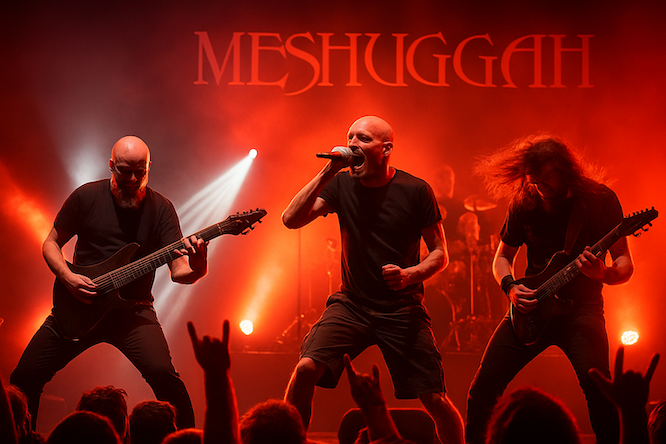Sweden is no stranger to musical exports, but few names have shaken the foundations of modern metal like Meshuggah. Born in the late 1980s in the northern city of Umeå, Meshuggah is more than just a band – they’re a phenomenon. Renowned for their mind-bending time signatures, complex rhythms, and unparalleled technical skill, Meshuggah have carved out a niche that borders on mathematical art.
From underground legends to global pioneers of “djent,” their music challenges the ear, defies conventions, and continues to influence an entire generation of musicians. But who exactly are Meshuggah, and what makes their sound so revolutionary?
Origins of a Sonic Tsunami
Formed in 1987 by guitarist Fredrik Thordendal, Meshuggah emerged from Sweden’s underground metal scene with a fierce commitment to doing things differently. Their early work, including the EP Psykisk Testbild and the debut album Contradictions Collapse (1991), showed signs of their distinctive style: technical, aggressive, and eerily precise.
It wasn’t long before they started to attract international attention, especially with the release of Destroy Erase Improve in 1995 – an album that would go on to redefine what extreme metal could be.
The Signature Sound: Precision and Polyrhythm
So what makes Meshuggah’s music so… Meshuggah?
- Polyrhythms: Their use of conflicting rhythms between drums, guitars, and vocals creates a hypnotic yet chaotic atmosphere.
- Low-tuned 8-string guitars: They were among the first to popularize extended-range guitars for rhythmically dense compositions.
- Mathematical structure: Their compositions are more like sonic architecture – calculated, layered, and deliberate.
- Vocals as percussion: Jens Kidman’s unique delivery emphasizes rhythm as much as melody or message.
Their music is often described as cerebral, mechanical, and even futuristic – and that’s exactly what fans crave.
Lineup That Defines Discipline
Meshuggah’s lineup has remained impressively consistent:
- Jens Kidman – vocals
- Fredrik Thordendal – lead guitar, backing vocals
- Mårten Hagström – rhythm guitar
- Dick Lövgren – bass
- Tomas Haake – drums (and occasional lyricist, and yes – also backing vocals!)
Haake, in particular, is widely regarded as one of the most precise and innovative drummers in the world of metal, often playing one rhythm with his hands and another with his feet.
Albums That Shaped a Genre
Each Meshuggah release marks an evolution in their sound, pushing boundaries and expectations. Highlights include:
Destroy Erase Improve (1995)
A genre-defining album that fused thrash, industrial and jazz influences. Considered a landmark in progressive metal.
Chaosphere (1998)
Darker, heavier, and more mechanically brutal. Introduced a more streamlined, groove-heavy direction.
Nothing (2002)
Marked by their shift to 8-string guitars. Dense, slow and crushing.
obZen (2008)
Arguably their most accessible album. It contains fan favorites like “Bleed” – a song that has become infamous for its near-impossible drumming.
Koloss (2012)
Focused more on groove and less on speed, delivering monolithic riffs and atmospheric depth.
Immutable (2022)
Their latest offering, showcasing maturity, clarity and a return to their most haunting and methodical roots.
Djent: The Genre They Didn’t Name
Although Meshuggah have repeatedly distanced themselves from the label, they are widely recognized as the godfathers of djent – a subgenre of progressive metal known for its staccato, palm-muted guitar riffs and complex rhythms.
The term “djent” itself is onomatopoeic – it mimics the tight, chugging sound of the guitar tone that Meshuggah helped pioneer. While younger bands like At The Gates Periphery, Tesseract, and Animals As Leaders embraced the tag, Meshuggah simply continued doing what they’ve always done: evolve.
Influence Beyond Metal
Meshuggah’s influence isn’t confined to metal. Their rhythmic innovation has caught the attention of:
- Jazz musicians
- Electronic producers
- Contemporary composers
- Mathcore and tech-death bands
Artists like Tool, Gojira, Lamb of God, and even Mike Portnoy of Dream Theater have cited Meshuggah as a key influence.
Live Shows: Controlled Chaos
Seeing Meshuggah live is like watching a precision machine at work. Their performances are known for:
- Immaculate timing
- Minimalist stage presence
- Powerful soundscapes
- Visuals synchronized with the music
It’s not a moshpit frenzy – it’s an immersive sonic experience where every note has weight and intent.
Criticism and Cult Status
Some critics label Meshuggah’s music as too cold, too technical, or too repetitive. But that’s missing the point. Meshuggah is not background music. It demands attention. It challenges. And in doing so, it creates devotion.
Their cult status is built not on radio play or mainstream appeal – but on respect. From musicians. From fans. From an industry that sees them as untouchable in their niche.
Meshuggah in 2024 and Beyond
With over 35 years under their belt, Meshuggah shows no sign of slowing. Their latest work continues to push sonic boundaries, and fans eagerly await each live tour, studio release, and obscure time signature breakdown.
They remain one of the few bands that consistently innovate without compromise.
FAQs about Meshuggah – The Swedish Metal Band
It’s a Yiddish word meaning “crazy” – fitting, considering their mind-bending music.
Is Meshuggah still active?
Yes! Their most recent album Immutable (2022) shows they’re still pushing boundaries.
What genre is Meshuggah?
Progressive metal, technical metal, extreme metal – and often considered pioneers of djent.
Who writes Meshuggah’s lyrics?
Mostly drummer Tomas Haake, who crafts abstract, philosophical and dystopian themes.
What’s the best Meshuggah album for new listeners?
obZen or Koloss are good entry points – heavy, yet structured enough to hook new fans.
Are they hard to listen to?
At first, yes. But with time, their complexity becomes addictive.
Final Thoughts: Order Within the Chaos
Meshuggah is more than just a metal band. They are engineers of sound, architects of rhythm, and visionaries of the genre. In a world where conformity often wins, they’ve built a career on controlled chaos.
To listen to Meshuggah is to challenge yourself. To see them live is to be overwhelmed. And to understand them… well, that’s a lifelong journey worth taking.

